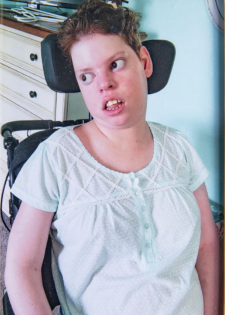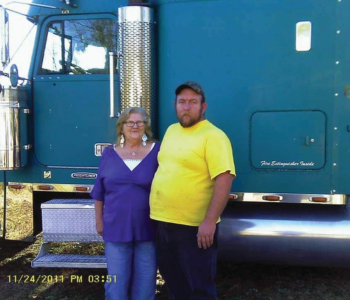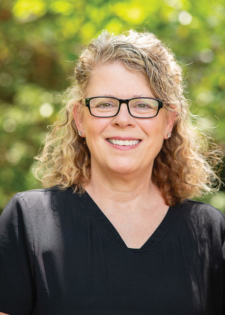“You didn’t realize that she’s a foot taller and she’s a Yankee?” joked Skinner.
They’ve been there for each other in the best of times and — now — in the worst.
In 2021, Skinner’s close cousin, William Downs, was diagnosed with cancer. Although he responded well to therapy at first, the cancer was later found to have spread to multiple organs. He reluctantly went on hospice, but asked Skinner to be with him. And Skinner asked Cloud, her friend, to help.
A few months later, Cloud’s daughter, Katie, was undergoing oral surgery when a terrible complication occurred: Katie, who is globally developmentally delayed and nonverbal, aspirated some of the blood. By the time she came out of surgery, it was too late. She, too, went on hospice, and Cloud turned to Skinner.
The two women have been friends for more than a decade. They’ve also been coworkers, both working as hospice nurses for Tanner Hospice Care. That they were able to be there for one another both personally and professionally during one of the worst times in their lives was, amid the tears, “a beautiful experience.”
“Just knowing that I could call on someone — and I did,” said Cloud. “I was a wreck. Looking back on it, I couldn’t have done it without her.”
A special kind of nurse
It takes a special nurse to serve in hospice care.
“It takes a compassionate heart,” said Skinner, a registered nurse who was recently promoted to Tanner’s hospice administrator. “Compassionate nurses are everywhere, but hospice is different. You’re dealing with a delicate situation. We know that our patients aren’t going to get better; we’re caring for them until they pass away. Our goal is to keep them comfortable and peaceful until then and to help them have the best quality of life in the time they have left, whether that’s days or weeks or months or years. We’re also there for families who are dealing with some of the worst days of their lives.”
Skinner said she always knew she wanted to be a nurse. “I felt like God called me to this field,” she said. “He opened up many doors for me to be able to go to nursing school,” including a Tanner nursing scholarship.
Although Skinner worked elsewhere for a time, she came home to west Georgia as soon as she could. She’d never worked in hospice — her only related experience was a short stint in home health as an occupational health nurse — but Tanner Hospice Care had an opening and she decided to give it a try.
“It just fell into place,” Skinner said. “I never gave a thought of leaving to do anything else because it felt like home, and it became a passion.”
For Cloud, who grew up in Ohio, her call to nursing happened a little later in life. Cloud’s daughter, Katie, was born with a disorder that caused daily seizures.
Cloud was a full-time mother and caregiver to her daughter until Katie was 14 and Cloud decided to go to nursing school.
“In a way, I felt it would prepare me better for her future, but I also felt it would give me something to do,” she said. “I knew Katie would pass before me, so it would give me something to fill my days.”
Cloud’s first job was at the emergency department at Grady Memorial Hospital, but within her first few weeks, her mother’s health began to decline and she went on hospice at Tanner.
“Her hospice nurse came in, and I just fell in love with her,” said Cloud. “She had this way of helping me be calm about the whole situation … My mom was on hospice for about three months, but I thought, ‘man, I want to do what she does. I want to be that for other people.’”
Cloud applied to Tanner Hospice Care as a part-time nurse, which became a full-time position by the time she was hired. Now, she’s an on-call nurse, working Wednesdays and Thursdays from 5 p.m. to 8 a.m. and Saturdays from 10 a.m. to 6 p.m.
Tanner Hospice Care is staffed by eight full-time nurses — four on-call nurses, one administrator and three case managers — as well as certified nurse assistants helping with hygiene care. With other hospice agencies opening in Carrollton and surrounding areas over the past several years, what continues to set Tanner Hospice Care apart is that it’s a “smaller, more intimate” hospice, said Skinner.
“We see patients often and we get to know them and their families,” she said. “We’re in those homes with patients and families two or three times a week. We’re often seeing patients more than their own families.”
While hospice may represent “the end” for many patients and families, Skinner said it’s much more than that.
At Tanner, after an initial referral, a nurse meets with the patient and family to explain the benefits of hospice specifically for them and what their team can do to help. They assess the patient’s needs — whether that’s medication for pain or anxiety, equipment or something else.
They also educate loved ones on how to help care for the patient, from how to change incontinence briefs in bed or how to position someone to change the sheets.
“We’re developing a plan of care so that we can fully meet that person’s needs individually —whatever we can do to add comfort for the patient but also have ease of care for their loved ones,” said Skinner.
With Tanner’s on-call team, patients and their loved ones also have around-the-clock access to a nurse so they can ask questions, voice concerns or ask for a visit in the middle of the night, said Skinner.
“They have that peace of mind that they’ve got somebody they can call to help them through whatever it is they’re dealing with,” she said.
Ultimately, it’s about hope, peace and joy in whatever time remains.
“I think, with hospice, that hope is very important,” said Cloud. “We focus on that hope as much as we can to help a patient and a family do the things they want to do, and I think that’s not well understood.”
“We hear it sometimes from other doctors: ‘You guys are the symptom management experts,’” said Skinner. “I don’t know if ‘expert’ is the right word, but we try to pull together our skills and resources to manage symptoms so patients have quality of life. We tell them to live the best life they can with what time they have left. You can still be living while you’re dying.”
“I think we alleviate fears so people can enjoy the final days, weeks or months of a person’s life—and be able to say goodbye,” said Cloud.
‘I Knew I Needed to Be There’
For Skinner’s cousin, William, — a diesel mechanic in the prime of his life — his cancer diagnosis came “out of the blue.”
Leiomyosarcoma is a rare cancer that grows in the smooth muscles of the body — the intestines, stomach, bladder and blood vessels. An initial surgery removed the primary cancer, and a second surgery removed a tumor in the brain.
Then the cancer returned, showing up in his stomach, liver and lungs.
His doctor suggested hospice.
“He didn’t really want to initially, but then he asked me to be his nurse,” said Skinner. In other words, he said, “I’m not going to go on hospice if you can’t be my nurse.”
Emotionally, Skinner couldn’t do his initial assessment; the two cousins had grown up together like brother and sister, and she wasn’t sure if she could handle it.

“I knew I was going to need the help of my coworkers to help me take care of him,” Skinner said.
Skinner leaned on Cloud for help with his needs at home and advice on helping him get his pain and nausea under control.
“I was too close to it,” she said. “Sometimes I needed a different perspective and somebody else taking a look at him.”
During his last few weeks, Skinner, Cloud and the Tanner team helped him feel well enough to do activities he enjoyed. He got out of the house to go fishing and worked on a few vehicles.
The longtime truck driver — who had driven through every state in the continental U.S. except Vermont — was planning a trip to that state when his health suddenly declined. He died peacefully at home.
“He tried to go out and do everything he could at the end,” Skinner said. “And he still had a great attitude. We sat at the table and laughed and talked about our childhood and memories of the past. His wife and sister both said they thought that was probably as therapeutic to him as the medicine. And we had time to come to terms with it.”
A few months later, just before Christmas 2021, Cloud’s daughter, Katie, had all four of her wisdom teeth removed.
During the oral surgery, she couldn’t follow commands to bite down on gauze to put pressure on the wounds and stop the bleeding. Unknown to anyone at that point, the blood drained into her lungs.
That night, Cloud said she knew something was wrong. By the next day, her oxygen saturation had started dropping and she rushed her daughter to an emergency department. The doctor took a chest X-ray, but there was nothing they could do.
The hospice administrator at the time told Skinner what was going on.
“I was like, ‘No, this can’t be happening,’” said Skinner. “It had been one of my fears. We knew that Katie’s health was fragile.”

“Shellie and I have worked together for so long, I felt like I have watched Katie through the years. She was part of us. When Shellie would have to bring her to staff meetings, I’d go over there and talk to her and pat on her and love on her a little bit.”
Then the administrator told Skinner, “Shellie wants you to be Katie’s nurse.”
As hard as it was, Skinner said, “I knew that I needed to be there. Shellie needed us as much as Katie needed us.”
“Emotionally, I was a wreck,” said Cloud, wiping away tears as she spoke. “I realized that all my knowledge was not helpful. I just know and trust Christy.”
With Skinner’s help and the support of other coworkers, Cloud spent the next seven days being Katie’s mom while Skinner and other hospice nurses handled Katie’s medications, calling her doctor and doing everything they could do to keep Katie comfortable in her last days.
“I’ve seen these nurses in action at work,” said Cloud. “They do this for everybody. I wasn’t anyone special. They just happened to know me longer than they know some of these other patients and families, but they do what they do.”
“I couldn’t have done it without them,” Cloud said, echoing the sentiments shared by Skinner during her cousin’s hospice care. “You know, maybe that was the whole purpose of me falling in love with hospice: knowing I would need them someday.”
Find more on Tanner Hospice Care at TannerHospiceCare.org.